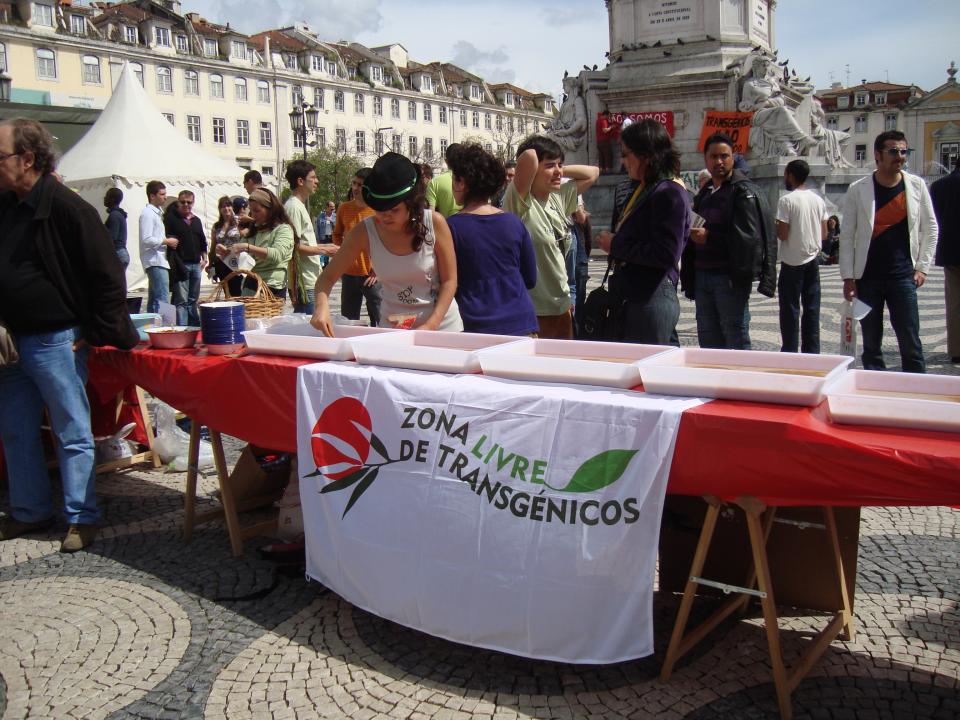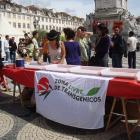The Portuguese section of the Environmental Justice Atlas (EJAtlas) features a selection of environmental conflicts in Portugal after the democratic revolution of 1974, and anti-GMO mobilization is one of them. The EJAtlas is a map of environmental conflicts in the world, set up and managed by the European Commission project “Environmental Justice Organizations, Liabilities and Trade (EJOLT).” Subsequently, the exploratory project “Portugal: Ambiente em Movimento” (Portugal: Environment on the Move) took this work further and built a website showcasing 60 conflicts in Portugal, including cases concerning non-sustainable agriculture.
According to the World Health Organization, GMOs can be defined as “organisms (i.e., plants, animals, or microorganisms) in which the genetic material (DNA) has been altered in a way that does not occur naturally by mating and/or natural recombination. The technology is often called ‘modern biotechnology’ or ‘gene technology,’ sometimes also ‘recombinant DNA technology’ or ‘genetic engineering.’” The European Union legislated on the issue of genetically modified organisms for the first time in 1990, authorizing the use of 17 organisms, although several member-states prohibited them in their territory.
In 1997, Greenpeace and Quercus, a Portuguese association for nature conservation, temporarily stopped the unloading of a GMO maize shipment in Portugal. The following year, the European Union enacted a de facto moratorium on the approval of new GMOs. In 1999, in Portugal, 12 organizations formed the platform “Transgénicos Fora do Prato” to inform people about and act on the subject. The platform’s name translates as “Transgenics out of Our Plate”; later, when producers of GMOs expanded their sectors of influence and entered the biofuels field, it changed its name to “Transgénicos Fora” (Transgenics Out). In 1997, the national meeting of environmental organizations called for a precautionary approach on GMOs by the Portuguese government, who, later in the year, suspended authorizations to sell GMO seeds. A survey of the Portuguese population in 2000 revealed a general cautious stand towards GMOs, with a fifth of the people who took part in the survey being radically unfavorable to GMOs.

Photo of the international action against genetically modified rice in the European Union, and specifically in Portugal, on 17 April 2010. The platform Transgénicos Fora prepared several trays of “sweet rice,” a traditional Portuguese dessert, with organic rice, and served it at Rossio plaza, Lisbon, while it informed people about genetically modified food and its implications.
Photo of the international action against genetically modified rice in the European Union, and specifically in Portugal, on 17 April 2010. The platform Transgénicos Fora prepared several trays of “sweet rice,” a traditional Portuguese dessert, with organic rice, and served it at Rossio plaza, Lisbon, while it informed people about genetically modified food and its implications.
Photo by the author Oriana Rainho Brás.
This work is used by permission of the copyright holder.
The situation radically changed in 2003, when the European Union passed comprehensive laws on the authorization, use, and surveillance of GMOs. That same year, the Portuguese government approved the cultivation of some GMOs in Portugal. In 2005, it regulated the coexistence of genetically modified varieties with conventional crops and organic production, although environmental associations argued this coexistence was impossible without contamination.
Meanwhile, in 2004, the Association of Algarve Municipalities (AMAL) was the first to declare the intention of being a GMO-free zone. However, only in 2006 did the government allow the legal possibility for farmers or municipalities to declare a GMO-free zone. Quercus and the municipal assembly of Aljezur (Algarve) criticized the government for demanding nearly impossible requirements and ensuring no guarantees to farmers in the process of creating GMO-free zones.
In 2007, the production of 50 hectares of GMO corn in Silves, Algarve, was made public and AMAL and the Almargem-Association for Defense of Cultural and Environmental Heritage of the Algarve positioned themselves against it. In August 2007, about 150 people organized the movement “Verde Eufémia,” and destroyed 1 hectare of the corn in protest against GMO crops. The authorities considered it an act of vandalism and a court issued proceedings against some of the participants.
External video. Link: https://archive.org/embed/Desobedienciaogm-en_xvid2000c500-3
Video by the movement Verde Eufémia about its protest action in a field of GMO corn in Silves, Algarve, August 2007. This video is in the public domain.
During the 2010s, the movement against GMOs has been raising related issues, like the dangers of patenting life forms and creating monopolies on seeds, the consequent threats to food sovereignty, and also the use of chemicals closely associated with GM crops. Recently, the use of herbicides in growing GMO crops became more visible due to the claim by the International Agency for Research on Cancer (IARC) that glyphosate is “probably carcinogenic to humans.” In August 2015, the chairperson of the Portuguese Medical Association wrote about the evidence of glyphosate’s harmful effects on health, appealing to physicians and to the responsibility of the government and the health directorate to take precautionary action by suspending the use of that substance (Silva 2015). Although more than 1,600 tonnes of glyphosate are sold in Portugal daily, the Ministry of Agriculture claimed it is unnecessary to test it in a routine analysis.
In 2016, the platform “Transgénicos Fora” collaborated with the Detox Project, assessing the presence of glyphosate in the urine samples of 26 volunteers and some food samples. The study revealed strikingly high levels of glyphosate in the urine, both compared to the maximum levels legally allowed and to other studies conducted in Europe. A TV documentary on glyphosate released in 2016 brought great visibility to this study’s results and to the issue of glyphosate in Portugal.
By 2016, 28 municipalities and 3 regions (Algarve, Azores, and Madeira archipelagos) had declared themselves to be GMO-free zones.
Opposition to GMOs in Portugal has been very active since the 1990s, bringing together environmental associations, farmers’ organizations (practitioners of conventional and organic modes of production), and individual citizens. The movement has consistently pointed to the complex implications of GMOs for ecosystems, human health, social justice, democratic sovereignty, and economies. However, a more encompassing public debate on GMOs has rarely occurred in Portugal. Even so, the matter continuously re-enters the public debate through different doors: it was so with the glyphosate issue and it is so with the negotiations of the Comprehensive Economic and Trade Agreement (CETA) and the Transatlantic Trade and Investment Partnership (TTIP). It remains an open issue.
How to cite
Rainho Brás, Oriana, Lúcia de Oliveira Fernandes, Sofia Bento, and Lays Helena Paes e Silva. “Mobilization Against Genetically Modified Organisms in Portugal.” Environment & Society Portal, Arcadia (Summer 2017), no. 23. Rachel Carson Center for Environment and Society. doi.org/10.5282/rcc/7962(link is external).
ISSN 2199-3408
Environment & Society Portal, Arcadia
 This work is licensed under a Creative Commons Attribution 4.0 International License.
This work is licensed under a Creative Commons Attribution 4.0 International License.
2017 Oriana Rainho Brás, Lúcia de Oliveira Fernandes, Sofia Bento, and Lays Helena Paes e Silva
This refers only to the text and does not include any image rights.
Please click on an image to view its individual rights status
- Ferreira de Almeida, José, Os Portugueses e o Ambiente: II Inquérito Nacional às Representações e Práticas dos Portugueses sobre o Ambiente. Oeiras: Celta Editora, 2004.
- Schmidt, Luísa. País (In)sustentável ambiente e qualidade de vida em Portugal. Lisboa: Novos Rumos, 2007.
- Schmidt, Luísa, Susana Fonseca, and Mónica Truninger. “Riscos Ambientais e Riscos Alimentares: Percepções e Atitudes.” In Os Portugueses e o Ambiente: II Inquérito Nacional às Representações e Práticas dos Portugueses sobre o Ambiente, edited by João Ferreira de Almeida, 173–236. Oeiras: Celta Editora, 2004.
- Sartori, Giovanna. “Organismi Geneticamente Modificati. Europa libera dagli ogm? Breve trattato sulla storia degli OGM in Europa e nel mondo”. Trento: Provincia Autonoma di Trento Servizio Europa, Ufficio per I Rapporti con l’Unione Europea, 2012.











